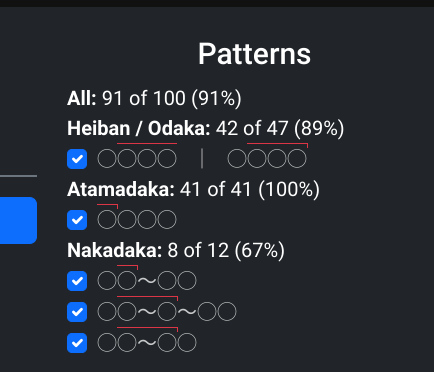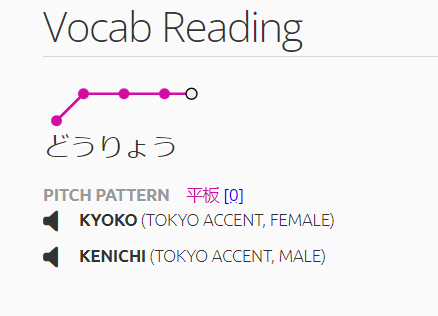I’ll try to make this post understandable and concise but I’m a bit of a rambler so sorry in advance.
Context: I have been studying Japanese for about 4 months now and I feel like I’ve made great strides. I enjoy it so much that it’s essentially downtime for me, so I’ve been able to do multiple hours a day almost every day.
Problem: I’m also a huge perfectionist and not only do I want to study Japanese, but get good at it. I know that there’s no right way to learn, but I’m still running into some struggles. I have two main problems:
-
pitch accent. I know that the common wisdom is that pitch accent is something that you should only study later, but I do want to integrate it into my speaking now, so that I don’t have to go through the pain of mainlining it after I’ve already learned thousands and thousands of vocabulary words with no/incorrect pitch information. I want to be well-rounded and have relatively good speaking, listening, writing, and reading, so building a good foundation of pronunciation is important to me.
-
Memory and usage. I don’t really know how to phrase this, but I suppose I’ve been studying basically out of a book/website (vocab WaniKani and some Anki, grammar Bunpro and Genki) since I started. I am in a Japanese class, but it’s a bit below my level (mid-Genki 1, and I’m studying mid-N4) and my classmates are not very motivated. I’ve joined a discord server and I chat with people from Japan, and I’m also in a Japanese conversation group weekly, which is full of very friendly and motivated people (both learners and natives) so that’s nice. But I find myself in conversation forgetting the more complex grammar and vocabulary that I’m learning from a book in favor of repeating the same basic phrases and struggling even when I should know how to say something. It’s frustrating.
I know that there’s an intermediate hump, and I definitely am becoming aware of how bad I am. So that’s definitely part of it. But mostly, with pitch accent review added on to my WK reviews, which requires me to switch websites and check for pitch accent and interrupt my studying, it inflates my studying time greatly and every time that I can’t remember a word or grammar point that I am supposed to know already in a situation where it would be useful, I find myself wondering if these inflated hours of study are even useful. I’m trying to follow the advice to actually use my Japanese and speak to people, but it feels like I’m not getting anywhere with it. Like I’m swimming against the tide of forgetting everything I’ve learned - and losing. And it really doesn’t help that everyone seems to have an opinion on how you should study, and says that all of the other methods are wrong and won’t get you there (especially the pitch-accent and immersion YouTubers shakes fist). Even though I know that something is better than nothing, I worry that I’m wasting my time.
I still enjoy studying Japanese at this point, but I can feel a sense of frustration building up and I’m worried that I’ll burn out if it keeps going on like this. My problem is that I don’t really know what to do or how to fix it. If I take a break it’ll only make this period of frustration longer and I’ll dread coming back to my studies, which makes me worry that I’ll give up entirely. But the way that I’m doing things now is just unsustainable. The idea of giving up on pitch accent doesn’t fix the second problem, and I would still dread the eventual day when I would have to face it and retread a lot of the work I’ve already done. Which would still burn me out. I don’t know how to get out of this plateau.
Anyway, thanks for reading. If anyone has any insight, advice, reccomended resources or exercises, or even just a word of sympathy, I would love to hear it. Even if it’s just 'i went through the same thing, you should just keep chipping away at it and you’ll get there eventually", I think that would do a lot to help with the sense of futility. Just one request, please don’t tell me to watch the same movie over and over again, I don’t think my soul could take it. Thank you.


 Still, I’ll try the website you linked. Thanks!
Still, I’ll try the website you linked. Thanks!



